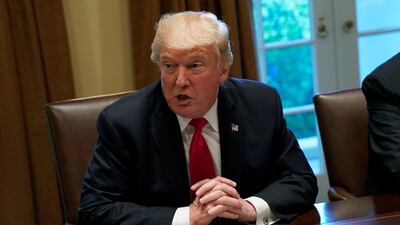Donald Trump’s highly anticipated announcement on Thursday to decertify the Iran nuclear deal has already moved the debate away from the White House.
The US Congress and European quarters will now determine the path forward on sanctions and the ultimate fate of the deal. also known as the joint comprehensive plan of action (JCPOA).
Mr Trump's decertification of the deal, first reported by the Washington Post, should not come as a surprise.
The US President has never run out of adjectives in describing his opposition to the JCPOA.
"An embarrassment", "horrible", and "worst deal ever" are all terms he used in attacking the deal before and after he took office. Twice this year, according to the New York Times, Mr Trump was agonised about certifying the agreement every 90 days as required by US law. Now that he will decertify, Mr Trump will no longer have to repeat the 90-day-process again.
_______________
Read more:
Trump to ‘decertify’ Iran nuclear deal
How is it helpful for Doha to cosy up to Tehran?
_______________
Instead, the debate will be moved to Congress who will have 60 days to decide whether to reimpose sanctions on Iran related to its nuclear program that were waived after the agreement.
European ambassadors have been crisscrossing Pennsylvania Avenue, meeting with members of Congress to agree on a path forward that would ultimately the deal. The Trump administration according to one US official who spoke to The National is hoping that by not certifying the deal, and without pulling out of the agreement, the Europeans would use the 60-day time frame (before Congress decides on sanction) to strengthen the agreement especially in the areas of ballistic missile defence and sunset clause. National Security Adviser HR McMaster called the agreement “incomplete”.
CNN reported this week that US Secretary of State Rex Tillerson and Senate Foreign Relations Committee Chair Bob Corker “were spearheading efforts to amend US legislation regarding Iran to shift focus away from the nuclear issue -- a move that could allow the US to stay in the multilateral...and also push back against Iran's other destabilizing behavior.”
In his speech on Thursday, Mr Trump is expected to address Iran's regional behaviour. According to Bloomberg, the US President may go as far as designating Iran's powerful Revolutionary Guard as terrorist organisation. One source in close contact with the administration told The National that "Congress has directed the administration to use the Treasury department's 13224 [terror list], but they [White House] may decide to also go the Foreign Terrorist organization (FTO) route." An FTO designation is harsher in labeling and economic consequences than the Treasury listing, and would put the IRGC in the same camp with Hizbollah and Al-Qaeda already on that list.
Inside the administration, the decertification bolsters the profile of US ambassador to the UN Nikki Haley who called the deal “flawed” and "not in US national security interest" in a speech at the American Enterprise Institute last month. Two lines that Mr Trump is expected to use on Thursday. Mr Tillerson had pushed to certify the deal back in July.
For now, Mr Trump will get the relief he wants from terminating the certification process as Congress carries the water for the administration on the tougher questions of how to navigate the talks with European allies, and the ultimate fate of the deal.


